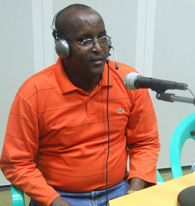Mohamed Olad Hassan, at left, a reporter for the BBC and The Associated Press, and chairman of the Somali Foreign Correspondents Association, recounts his experience covering a deadly ceremony in Somalia’s capital, Mogadishu. Olad narrowly escaped death after a suicide bomber killed at least 23 people on December 3 at the graduation ceremony at Hotel Shamo. Three journalists were killed in the attack…
It was a Thursday morning, December 3. As usual, I got ready for my work as a journalist. I had an invitation that was given to me by Mohamed Zobe, one of the organizers of what was supposed to be a joyful graduation ceremony.
I and my colleague Ayaanle Husein Abdi, a reporter for the BBC Somali service, drove from my office toward the hotel, which is about 550 yards (500 meters) from my office. We were welcomed by jubilant students, whom we knew by face at the main gate of Hotel Shamo, where their Benadir University graduation ceremony was due to start.
There were dozens of armed body guards outside the hotel; they were apparently accompanying government ministers invited to the ceremony. Nobody checked us. There were only two men sitting in front of the hotel’s meeting hall. They looked at our invitation and allowed us to pass. Everyone assumed this would be a peaceful ceremony.
We sat in two empty seats in the second row of seats where ministers, doctors, and other dignitaries were sitting. There were hundreds of people in the meeting hall. The students were all dressed in colorful uniforms for their graduation. The hall had been brightly decorated, and there was a feeling of excitement—such ceremonies rarely happen in Mogadishu. With the conflict raging throughout the capital, the chance to attain academic credentials are limited. This ceremony, perhaps, symbolized a trace of hope: People’s lives could continue despite the shelling.
Proud parents beamed at their graduating loved ones, who were also sitting in the hall. Journalists, particularly the cameramen, were right in the front for a good view. People were making speeches, and we were taking notes, as usual.
Then all this brightness turned to darkness.
All I remember is being covered in dust. Some debris apparently from the roof of the hall hit me and there was no light anywhere. I looked across and the young guy sitting next to me was dead. The seat he had been sitting on was mine. We had changed positions for one moment, when I had left momentarily to move my recorder nearer to the speakers. That’s when the explosion occurred. It was my luck not to be sitting in that chair.
I recalled later that the dead man was a journalist, Mohamed Amin, at right, a reporter for Radio Shabelle, a local FM Station in Mogadishu. I had to jump over him to get out. I tried to get over the table where the ministers had been sitting. There were dead bodies right in front of my eyes. I had to step over their bodies too.
People were screaming the same question over and over: “Is it a bomb? Is it a bomb?” I went through the door that the ministers had come through when they entered the hall and I hid in a small room. It was a very dirty, unused toilet but already three other people, including a Reuters reporter, Abdi Guled, were there with me.
The survivors who could move immediately ran out of the hall because people thought a mortar had hit and that there could be another one. We had no idea what had happened. But I didn’t hear any more explosions and I had to go back into the hall to get out.
It was a shocking, terrible scene. There was blood splattered everywhere. I was really in disbelief, in shock. I have never seen so many people killed at the same time. All these bodies were there, right in front of my eyes, including two journalists.
I looked at the roof to see if there had been some kind of rocket attack but the roof was intact. So I knew something had exploded in the hall—either a suicide attack or a bomb or a mine. I went outside and the street was filled with people trying to rescue their friends and family.
No one knew who had been killed and who had survived.
I could see my colleagues—journalists I had been talking to just moments before—lying on the ground covered in blood. Hassan Zubeyr, at left, a cameraman for the Dubai-based Al-Arabiya TV and Abdulkhafar Abdulkadir, a freelance photographer who had only arrived five minutes before the explosion, were lying on their stomachs in a pool of blood. Abdulkadir died of his injuries in the afternoon.
One other colleague, Omar Faruq, a Reuters photographer, was right in front of me on his stomach. I couldn’t tell whether he was alive or dead, but later noticed he had his cheek bone broken. Another colleague, Abdulkadir Omar, a reporter for Universal TV was being carried out as locals began to arrive and help out. He had his hand on his bleeding forehead.
It was a terrible few minutes. It’s still impossible to understand how everything turned from a colorful celebration to grief within seconds.
During the rescue operation at the hotel, people concentrated on the dignitaries while injured journalists were left bleeding for some time. It helped us realize that we needed to create our own support, so we started the Somali Foreign Correspondents Association. We formed this union to establish a permanent office that will help journalists in times of emergencies. Our dream is to have at least one ambulance at our disposal to transport wounded colleagues to hospitals and to arrange evacuations if needed.
(Reporting from Mogadishu)
